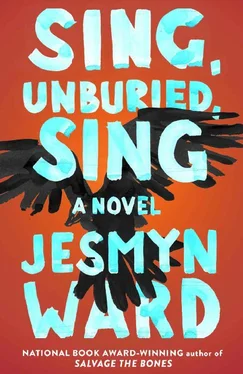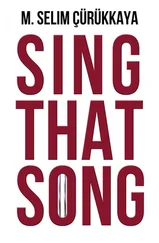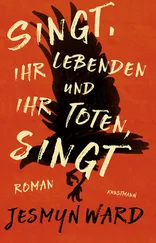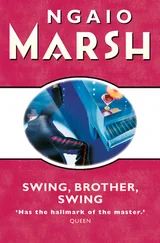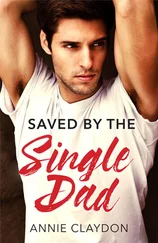“It ain’t healthy,” Mama said after I brought Michael home the first time, and we sat on the sofa and watched TV. Pop walked through the house and looked past us. After Michael left, Mama began cooking. I sat at the kitchen table and polished my nails, a soft, pastel pink color, the color of cotton candy, because I thought it looked good on my hand. I hoped the color would make Michael take my fingers in his mouth and say: I gotta get me some of this sweet .
“All you hear, all you see, is him,” Mama said.
“I see plenty else,” I said. I wanted to defend myself, but I knew I was lying, because when I woke up in the morning, I thought of Michael’s laugh, of the way he flipped his cigarettes before he lit them, of the way his mouth tasted when he kissed me. And then I remembered Given. And the guilt I felt when I realized it.
“Every time you say something, you look at him like a little puppy dog. Like you waiting for him to pet you.”
“Mama, I know I ain’t a puppy.”
“You exactly that.”
I blew on the fingers of my right hand and waved them in front of my face, breathed in the hot smells of the kitchen: beans bubbling on the stove, corn bread cooling, the smell of the nail polish, which made my stomach turn, but in a way that I liked. I’d huffed before I got pregnant with Jojo, on my knees in a shed in one of Michael’s friends’ yards, one of the many friends that Michael had whose parents were never home. The world had tilted and spun, and my brain had seemed to break out of my skull and float off. Michael had grabbed my shoulders, anchored me, pulled me back into myself.
“So you don’t like him?” I asked.
Mama breathed out hard and sat across from me at the wooden table. She grabbed my unpolished hand and turned it palm up and tapped it as she spoke.
“I . . . it ain’t his fault what he was born to. Where.” Mama took a deep breath. “Into that family.” She took another hitching breath, and the way her face folded and smoothed, I knew she was thinking of Given. “He just a boy, a boy like any other his age. Smelling his piss for the first time and thinking with his nether-head.” Like your brother , she didn’t say. But I knew the sentence was in her.
“I ain’t doing nothing crazy.”
“If you ain’t already having sex with him, you will be soon. Protect yourself.” She was right, but I didn’t listen. Ten months later, I was pregnant. After Michael got the test and I took it, I brought it to Mama and told her. I told her on a Saturday because Pop worked on Saturdays, and I didn’t want him to be there. It was an awful day. It was early spring, and the rain had been booming all night and all morning: sometimes the thunder was so close, it made my throat judder, closed my windpipe, made it hard for me to breathe. I’d always been scared of lightning, always thought it would hit me one day, burn through the air and touch me with a great blue arc, like a spear streaming straight for me, and me helpless when the sharp head sank in. I’d grown up paranoid, thought the lightning followed me when I was in my car, when it rattled my windows. Mama was hanging plants to dry in the living room on string that Pop had hung on a zigzag back and forth across the room, so the plants listed in the electric air, and Mama half laughing and muttering, the soft backs of her arms flashing white and then not: a kitten showing its belly.
“Here he come. Been singing for weeks.”
“Mama?”
She stepped down from the pine step stool Pop had built her. He’d carved her name into the top of it; the letters looked like wisps of smoke. Philomène. It had been her Mother’s Day present years before, when I was so little the only help I could give was to scratch a little star, four lines crossed at the middle, on the side of her name, and Given had carved a rose that looked like a muddy puddle, worn smooth by Mama’s feet.
“I was wondering how long it was going to take you to build up the nerve to tell me,” she said, the stool tucked under her arm like she would put it away, but instead of walking to the kitchen, she sat on the sofa and let the step stool hang over her legs across her lap.
“Ma’am?” I asked. Thunder boomed. I felt hot around the neck and armpits, like someone had splashed hot grease across my face and chest. I sat down.
“You’re pregnant,” Mama said. “I saw two weeks ago.”
She’d reached across the wood in her lap and touched me then, not with the pitiless hand of the lightning, but with her dry, warm hands, soft under the skin she’d worked hard, just a second of a touch on my shoulder, like she had found a piece of lint there and was brushing it off. I surprised myself and curled into it, leaning forward, and my head on the wood and her hand rubbing circles on my back. I was crying.
“I’m sorry,” I said. The wood hard against my mouth. Unyielding. Wetting with my tears. Mama leaned over me.
“No room for sorries now, baby.” She grabbed me by the shoulders, pulled me up to look at my face. “What you want to do?”
“What you mean?” The closest abortion clinic was in New Orleans. One of the more well-off girls in my school whose daddy was a lawyer had taken her after she’d gotten pregnant, so I knew it was there, and it was expensive. I thought we had no money for that. I was right. Mama gestured at the hanging plants, the listing jungle above our heads bristling in the cool electric air.
“I could give you something.” She let the end of the sentence trail off, disappear. She looked at me like I was a smudged book she was having trouble reading and cleared her throat. “It was one of the first things I learned how to do, in my training. It’s the one tea I never have enough of.” She touched my knee then; she’d found another piece of lint. She leaned back again, and her culottes stretched tight across her knees. Years later, that’s where she’d first start feeling the pain from the cancer: in her knees. Then it moved up to her hips, her waist, her spine, to her skull. It was a snake slithering along her bones. Sometimes I think back to that day, to her sitting on the sofa, giving me those little touches, little touches that didn’t want to turn me one way or the other, even though she wanted Jojo, I think, because her grief for Given was hungry for life. Sometimes I wonder if the cancer was sitting there with us in that moment too, if it was another egg, a yellow egg knit of sorrow, bearing the shape of bullet holes, wiggling in the marrow of her bones. That day, she was wearing a blouse she’d sewn herself from a print full of pale yellow flowers. Roses, looked like. “You want this baby, Leonie?”
A whip-crack of lightning lit the house, and I jumped as the thunder boomed.
I choked and coughed; Mama patted my back. The humidity made her hair alive around her face, tendrils of it standing up and curling away from her buttery scalp. The lightning cracked again, this time like it was right on top of us, feet away from arcing through the house, and her skin was white as stone and her hair waving and I thought about the Medusa I’d seen in an old movie when I was younger, monstrous and green scaled, and I thought: That’s not it at all. She was beautiful as Mama. That’s how she froze those men, with the shock of seeing something so perfect and fierce in the world.
“Yeah, Mama,” I said. It still twists something in me to think of that: the fact that I hesitated, that I looked at my mama’s face in that light and felt myself wrestle with wanting to be a mother, with wanting to bear a baby into the world, to carry it throughout life. The way we were sitting on that sofa, knees tight, backs curved, heads low, made me think of mirrors and of how I’d wanted to be a different kind of woman, how I’d wanted to move somewhere far away, go west to California probably, with Michael. He talked about moving west and working as a welder all the time. A baby would make that harder. Mama looked at me and she wasn’t stone no more: her eyes were crumpled and her mouth crooked, and that told me she knew exactly what I was thinking, and I worried that she could read minds, too, that she would see me shying away from who she was. But then I thought of Michael, of how happy he would be, of how I would have a piece of him with me always, and that unease melted like lard in a cast iron pot. “I do.”
Читать дальше
